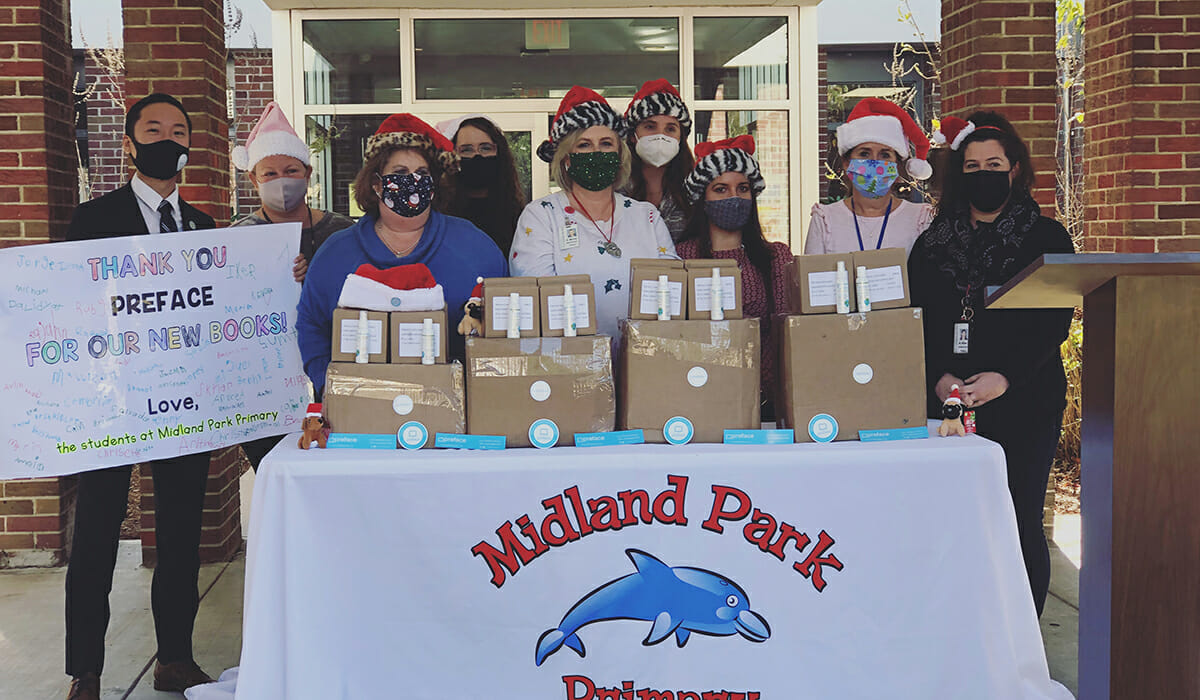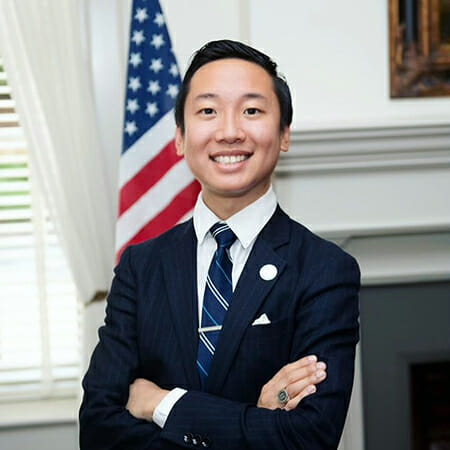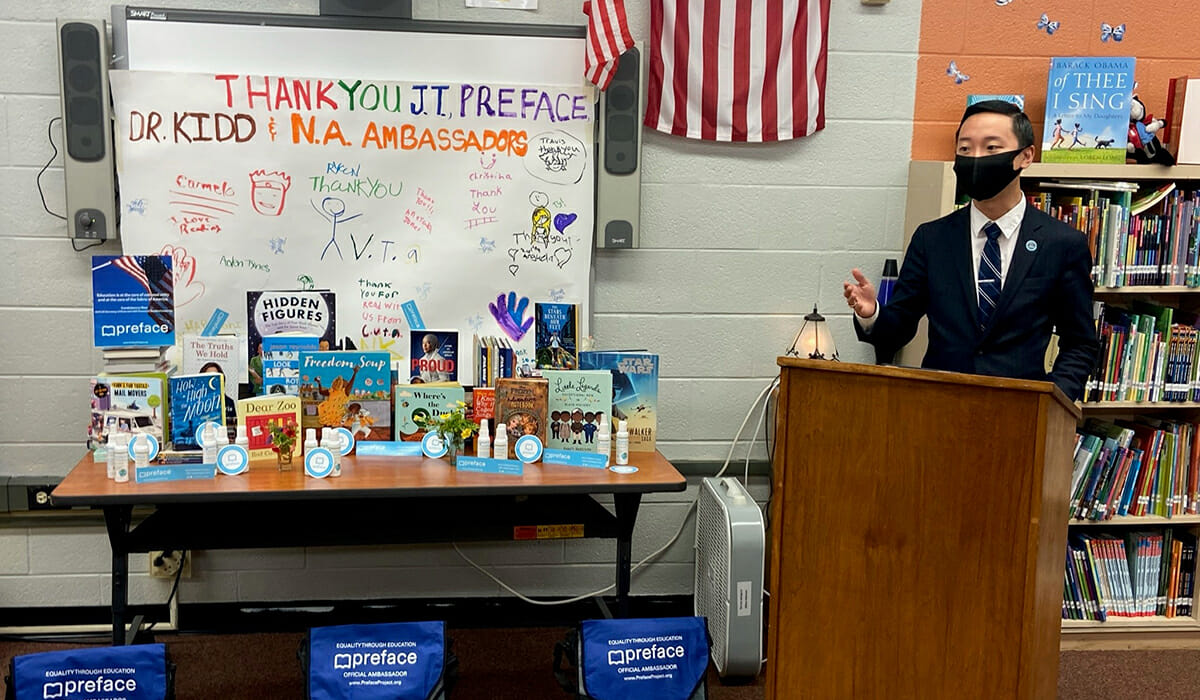Volunteer Returns to Hometown to Promote Childhood Literacy With Mentorship Program

Meet Daily Point of Light Award honoree JT Wu. Read his story and nominate an outstanding volunteer or family as a Point of Light.
Growing up as a child of immigrants in Gwinnett County, Ga., JT Wu had a strong support system from his parents, who he said spoke English in the home and were always able to help him with his homework. After returning to his hometown in 2018, JT was greeted by a much more diverse community than the one he had been raised in, with many different languages being spoken by its residents. Through his work in the community, JT learned that 57 percent of kids in Gwinnett County weren’t reading English proficiently by the time they reached third grade.
Shocked by that statistic and wanting to provide kids with the same support he had while growing up, JT reached out to teachers to see what he could do to help and learned they desired some extra peer-to-peer resources. From there, he founded Preface, a nonprofit that promotes childhood literacy by pairing high schoolers with elementary school students to mentor and read to them. As the executive director, JT has helped oversee mentors facilitate over 700 additional reading hours for students at schools in 11 states across the country.
What inspired you to start Preface?
When I came back home to Gwinnett in 2018, I was fortunate to be able to plug back into the community and serve on the library board. One of the statistics that hit me over the head was that here in Gwinnett County alone, 57 percent of our kids aren’t reading English proficiently by the time they get to the third grade. Believe it or not, that’s actually better than the national average. The Department of Education says between 63 and 65 percent of our students nationwide aren’t reading English proficiently by the time they get to the third grade. Those statistics were taken in 2019, so that was before COVID really did a number on everything.

As a child is growing up in a home where English isn’t spoken or mom and dad might have to be working multiple jobs to make ends meet, it can be difficult to find the kind of educational supports that might be necessary for a kid to learn both a new language and a curriculum in the classroom at the same time. What we wanted to do was talk to as many educators as possible and ask what can we do to help. That’s how the idea of Preface was born. Teachers said we could really just use a couple more resources, especially peer-to-peer resources, and especially resources that are multilingual and might be able to meet these students where they are, whether that’s in Spanish or Vietnamese or Korean or otherwise. We said, OK, what if we worked to train and empower high school students in every community — starting here in Gwinnett but now operating in 11 states and growing across America — to learn and understand educational best practices of how to read to young children, how to foster literacy, and really be complementary to what a lot of teachers are already doing in the classroom. We tested that out, had a good pilot program, and we had every kid in this program back in 2019 go from functionally literate to reading on or above grade level in as a little as ten weeks. We were super encouraged by that.
What exactly does Preface do?
For us, it’s not that we’re reinventing mentorship. We’re just trying to get these tools and trainings and these students, who want to serve and give back and are present in every community, into as many hands of educators as possible. We work for the company completely pro bono. We offer our services to the school completely free of charge, and we’re doing that both in person now and virtually. When COVID hit, we innovated. We invested in a digital platform, built out a Preface portal, partnered with technology companies like Epic, which is a book platform with over 40,000 books in multiple languages and multiple reading levels, and like Google, who is helping us with video communications technology and setting up our sessions in safe and secure virtual meeting rooms. We’ve been able to rapidly scale and get these services into the hands of more teachers and more students across the country. Since October 2020, our ambassadors — which is what we call our high school students — nationwide have facilitated over 700 hours of additional reading sessions for kids across the country, and through a pandemic and through all the challenges of distance learning.
Can you describe how Preface’s mentoring works?
Everything we do we want to make sure is tailored and is meeting the needs at the request of the educators and the folks who are actually on the ground and working with these students day in and day out, and know what the needs of these students are. … Because these students are interfacing with their mentees during the school day, we’re often able to find those 30 minute windows where maybe there’s a break on the high school side, and the elementary school is doing some sort of intervention and could use a little bit of additional personalized assistance from one of our highly trained mentors and ambassadors. We can make that happen, now that we’re in a virtual world, basically instantaneously, for free and at the click of a button. Our ambassadors go through a training course designed by expert educators. We have an educational advisory board of folks with over 70 combined years of educational experience both at the high school and elementary school sides, as well as special education and literacy instruction. We’ve distilled best practice concepts into video formats and interactive formats that our ambassadors are able to easily digest and put into practice immediately.
Why does the issue of childhood literacy especially resonate with you?
I think it is so fundamental to lifelong success. Taking a step back, there are studies that have been done that say if you are able to read English proficiently by the third grade, you’re four times less likely to drop out of high school. You’re 60 times less likely to spend any time in prison. Correlation is not causation, but for us, these are things we can do to help invest really early on in the fundamental development of a young child. Young students’ brains are so malleable. They’re absorbing so much information. Their brains are building over 700 connections a second. Being read to aloud as a child is recognized as really one of the most important activities leading to literary acquisition. If we can invest and continue to expose the next generation to as much reading and as much language as possible and give them those foundations for lifelong literary success, that’s something where we feel we can make a tremendous impact early on, and communities can come together to make that happen.
Are there any future partnerships, programs, or events that you are excited about?
We’re constantly launching new partnerships. If [readers] go onto our website, they can see our newsroom with press releases where we keep folks updated as new partner schools and partner communities come and join the Preface family. We also are constantly innovating. We’re making investments in technology. We have a fundraiser coming up in October here in our headquarters of Gwinnett County, Ga., that we’re excited about because again we offer these services at no cost to the schools. We don’t take a salary from the organization, so every single dollar given to us we’re able to invest right back into our programming, right back into growth, right back into communities.
With every school we partner with, we also love to give what we call legacy gifts, which is a donation of about 150 to 200 brand new children’s books, specifically chosen by the teachers in that community and tailored for the demographics of that particular school and particular area. For example, if there’s a heavily Spanish-speaking portion of a community, that legacy gift would be multilingual Spanish and English books and books that really emphasize the importance of representation. We’ve been really excited to be able to see kids embrace being able to see themselves in the books they’re reading that are available in their local libraries. Also during the pandemic, we partnered with generous sponsors like EarthBaby and others who have donated tens of thousands of dollars in pharmaceutical products and healthcare resources like hand sanitizers and gels that we bundle up and give to each of our partner schools across the country.
What has it meant for you to be able to start this in the community where you grew up?
It’s meant the world. It is such a blessing to have been able to come back to my hometown and really be embraced by folks here, and be able to make a difference, and give and ensure that other students and young kids in this community have access to the same type of opportunities and resources and supports I was blessed to have had growing up. It’s been incredibly gratifying. Georgia is changing. Gwinnett Country is becoming incredibly diverse. I think it’s such a microcosm of what’s happening in the rest of the country. We’re able to say here in Gwinnett, or here in Georgia, or here in the south, this is how we’re harnessing that diversity and that incredible multilingualism to be a competitive advantage in an increasingly interconnected global economy. This is a model that has worked for us here. It can work in states across the country.

What’s been the most rewarding part of your work?
I think the most rewarding part has been seeing these kids light up. We transitioned to a virtual model right at the onset of COVID-19 so we were able to continue keeping those mentoring relationships with our ambassadors and the young kids alive, even through the heart of the pandemic, through safe and secure virtual reading sessions. For us, to see kiddos put the biggest smile on their face and say, “This is what I want to read today,” and being able to go from not knowing what the words are in a sentence to being able to read and sound out those words pretty expertly — that has been incredibly encouraging to us.
What do you want people to learn from your story?
I think service is so important. Everybody can do it. Everybody can serve. The more we are giving back and investing in our own communities, and empowering especially the next generation to be those beacons of light for the kids that could be their little siblings, the kids who are looking up to them, that for us is such an incredibly valuable thing. Our values here at Preface are literacy, community and opportunity, and that is what I think is so exciting about this model of national service. We are getting into the heads of high school students and educators across the country that you can make a difference in you own backyard and you can do it around your own schedule. You can do it during the school day. You can do it in these short bursts. Our national core of ambassadors are giving 30 minutes to two hours every single week across a couple of semesters, but that adds up to 700 plus hours. That’s over 29 full 24-hour days of full incremental reading sessions that have been facilitated that wouldn’t have been there otherwise for these students.
Do you want to make a difference in your community like JT? Find local volunteer opportunities.